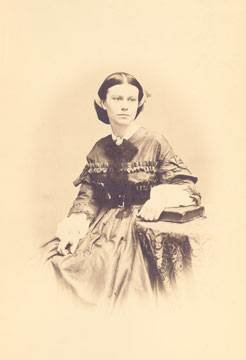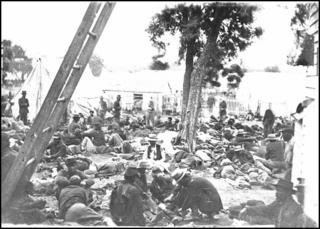Civil War Nurse
 This lady, better known as Nellie Mitchell, was at the opening of the war a resident of Montrose, Pennsylvania, where she was surrounded by friends, had a pleasant home, was amiable, highly educated and accomplished. Her family was one that was often named as “our first families.”
This lady, better known as Nellie Mitchell, was at the opening of the war a resident of Montrose, Pennsylvania, where she was surrounded by friends, had a pleasant home, was amiable, highly educated and accomplished. Her family was one that was often named as “our first families.”
Image: The Dying Soldier
Miss Mitchell left her home in Montrose early in May 1861, and went to New York City, where she took a course in surgical nursing at Bellevue Hospital, to prepare for assuming the duties of an army nurse. The terrible sights she witnessed there so impaired her health that after six weeks she went to Woodbury, Connecticut, where she remained with friends while awaiting orders, and in September her labors in the military hospitals began.
She had intended to give her services to her country, but after witnessing the frequent destitution of comforts among those to whom she ministered, she decided to receive the regular pay of a nurse from the Government, and spent it entirely on the suffering ones around her. Luxuries sent by her friends for her own use she used in the same manner.
Miss Mitchell spent the first three months in Elmore Hotel Hospital in Georgetown, District of Columbia. Around this place cluster some of the pleasantest, as well as the saddest memories of her life. The lack of a systematic plan of action in this hospital, made the tasks of the nurses peculiarly trying. Yet Miss Mitchell never found more delight in her labors, and never received warmer expressions of gratitude from her “boys.”
On being brought for the first time to a place associated in their minds only with gloom and suffering the joyful surprise of these poor fellows at finding kind hearts and willing hands ready to minister to their wants with almost motherly, or sisterly affection, exceeded words and called forth such manifestations of gratitude as amply rewarded those who watched over them.
Often as they saw these kindly women engaged in their busy tasks of mercy, their eyes would glisten as they followed them with the most intense earnestness, and their lips would unconsciously utter remarks like these, so homely and spontaneous as to leave no doubt of their sincerity. “How good, how home-like to see women moving around. We did not expect anything like this!”
But much as she loved her work and had become attached to her charges, circumstances of a very painful nature soon compelled Miss Mitchell to resign her post in that hospital. But in less than two weeks, she entered St. Elizabeth’s Hospital in Washington, across the Eastern branch of the Potomac in an unfinished wing of the Insane Retreat.
It was about the last of December that she entered there, and in February she was compelled to relinquish the care of her ward by a severe and dangerous illness that lasted seven weeks. Her greatest joy in returning health consisted in her restoration to the duties she loved.
Miss Mitchell had scarcely recovered from this illness when she was unexpectedly summoned home to the deathbed of her beloved mother. After a month’s absence, she again returned to Washington, but was sent directly to Point Lookout, in Maryland, where a hospital had recently been established. She remained about two months at Point Lookout.
Her next station was at the Ware House Hospital, Georgetown, District of Columbia, where she was employed in the care of the wounded from the Second Battle of Bull Run. Most of these poor men were suffering from broken limbs, had lain several days uncared for on the field, and were consequently greatly reduced in strength.
They had suffered so much from their removal in the jolting ambulances, that many of them expressed a wish that they had been left to die on the field, rather than to have endured such torment. Ellen was always best pleased to work in the surgical wards, where she dressed and cared for wounds with almost the skill, and more than the tenderness, of a practiced surgeon. This hospital was too open for cold weather, and in February was closed.
Miss Mitchell was then transferred to Union Hotel Hospital, where five of the nurses were laid up by illness, and her duties became unusually arduous. The hospital had been closed, refitted, improved and reopened. The soldiers were so kindly cared for there, but with great regret they saw the hospital broken up in March.
Miss Mitchell’s inclination would then have led her to the front, but she was forced to obey orders, and was transferred to Knight Hospital in New Haven, but she became so worn out from her long service that she was compelled to resign her position as army nurse. She accepted a desirable situation in the Treasury Department in July 1863, but she was not satisfied with that, and again enlisted as an army nurse after a few months, resolving never again to abandon the service, as long as the war continued.
This was in the beginning of May, 1864, and Ellen was immediately sent to Fredericksburg to assist in caring for the wounded from the Battle of the Wilderness. The scenes and labors of that terrible period are beyond description. Miss Mitchell was amidst them all, and like an angel of mercy made herself everywhere useful to the crowds of ghastly sufferers from those fields of awful carnage.
When the Union army left Fredericksburg, most of the wounded were transferred to Washington. Miss Mitchell would again have preferred to go to the front, but obeyed orders, and went instead to Judiciary Square Hospital in Washington, where she found many of her former patients.
After she had spent one day there, she would not willingly have left those poor men whom she found so greatly needing a woman’s care. For weeks the mortality was fearful, and she found herself surrounded by the dead and dying, but gradually this was lessened, and she became engaged in the more delightful duty of superintending the improvement of convalescents, and watching the return to health of many a brave hero who had perhaps sacrificed limbs in the service of his country. Here she remained, until the final closing of the Hospital in June, 1865, which also ended her army service.
The four years of her service were filled with self-sacrifice and faithful devoted labor. Perhaps her own words extracted from a letter to the writer of this sketch will give the best statement of her views and motives.
I only did my duty, did what I could, and did it because it would have been a great act of self-denial not to have done it. I have ever felt that those who cheerfully gave their loved ones to their country’s cause, made greater sacrifices, manifested more heroism, were worthy of more honor by far, than those of us who labored in the hospitals or on the fields. I had not these ‘dear ones’ to give, so gave heartily what I could, myself to the cause, with sincere gratitude, I trust, to God, for the privilege of thus doing.
SOURCE
Woman’s Work in the Civil War





